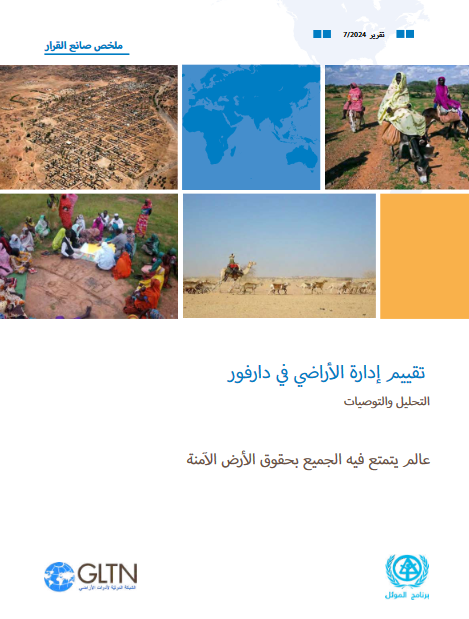Resource information
In August 2020, the UN-Habitat Sudan Country Programme and the Global Land Tool Network (GLTN) published the “Darfur Land Administration Assessment: Analysis and Recommendations” report, developed in close cooperation with the United Nations Country Team of Sudan, the United Nations - African Union Hybrid Operation in Darfur (UNAMID) and the Darfur Land Commission.
The report assesses the statutory and customary land administration systems in the five Darfur states and provides guidance on how to secure land and property rights of the people voluntarily returning to Darfur and of other vulnerable groups - such as IDPs, refugees, women and youth. The report also provides recommendations for improving the land administration in a fit-for-purpose, incremental and feasible manner for the benefit of the whole Darfur’s population. An adequate and effective land management system will be essential for supporting Darfur’s transition from the humanitarian to the development phase while ensuring its social and economic development and the success of peace and stabilisation efforts. The report is the result of field assessment, interviews and consultations with relevant informants from key UN organisations, UNAMID, Darfur Land Commission, Voluntary Return and Resettlements Commission, NGOs, government institutions, native judicial administrations and with tribal leaders, IDPs, nomads and famers.
The report identifies key land sector stakeholders and institutions: government, customary institutions, non-state actors and the UN agencies. It describes and clarifies land-related policies, land administration systems, dispute-resolution mechanisms, tenure typologies and technical processes - both statutory and customary. It determines gaps in the overall capacity and the capacities needed to address the challenges, and it identifies sets of early recommendations, strategies and priorities for action.
The recommendations are divided in three levels: strategic, technical and short-term. The strategic recommendations regard how to inform policy-formulation and decision-making for improving land management and administration. They address the need of: better understanding the land-and-conflict nexus; broadening the range of land tenure options legally recognized; formally acknowledging the role of customary land administration actors; improving existing land-dispute resolution mechanisms and women’s land rights; shifting towards fit-for-purpose land administration approaches; defining roles and responsibilities of state and federal institutions; and of building partnerships within and beyond the Durable Solutions Framework.
The technical recommendations provide further detail on how to clarify and improve land administration functions of different government institutions and the roles of statutory and customary actors, including strengthening the capacity of government and Native Land Administrations to: undertake planning, surveying, land regularisation, land expropriation, and regularisation of IDP settlements; improve land information management and financing; and to develop land administration and HLP rights capacity of key stakeholders. Finally, the report includes a set of short-term recommendations for concrete actions on land governance, land-use planning, land information management and dispute-resolution mechanisms, and it proposes some capacity development approaches for government, Native Land Administrations, community-based and civil society organisations, academia and land professionals.

